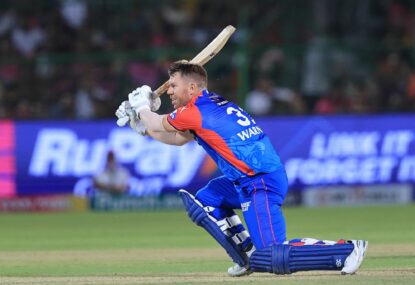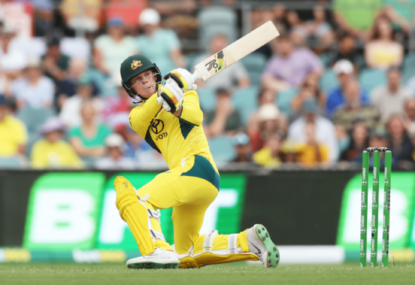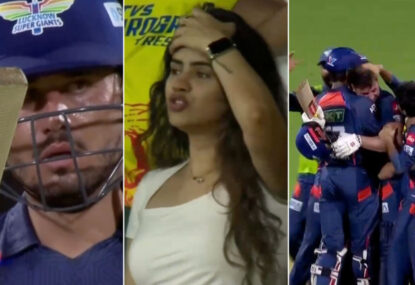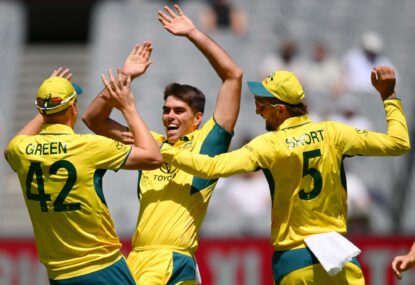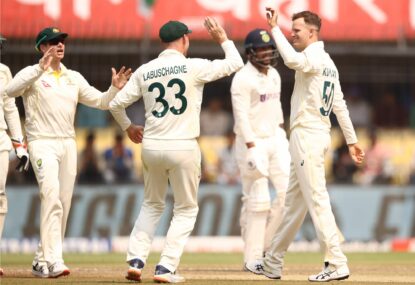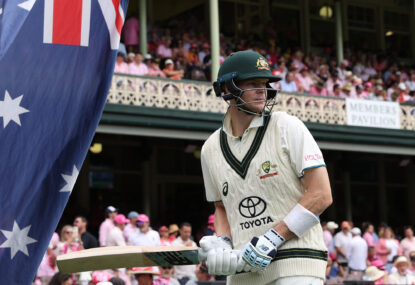Earlier this year I argued that allowing a penalty kick at goal in rugby from anywhere on the field was the dumbest thing in sport, with yelling “catch” in cricket when a ball is in the air a close second.
After watching the first session of the Second Test in Dubai, I am reconsidering. The main reason that the rugby penalty goal topped the list was that it is an obstacle to a better and more entertaining game and illogical and occasionally unfair. But I’d have to concede that some people might actually like the suspense of waiting to see if a long distance kick goes over.
Yelling “catch” at someone who is about to catch a ball just seemed plain dumb, even if painfully so. But it was hard to furnish clear evidence that it has done harm, by distracting fielders and leading to dropped catches, even though I was certain it had.
But watching Marnus Labuschagne drop Fakhar Zaman at mid-on off Jon Holland in the first session of play, I thought again.
As the ball came at reasonable if not high pace towards Labuschagne you could hear a loud cry of “catch”.
Looking at the slow-motion replay you could see Holland’s mouth opening wide and yelling momentarily before the ball seemed destined to land in Marnus’s well-positioned hands.
I can’t be sure, but I strongly suspect that he dropped the ball because he snatched at it slightly, thanks to the extra stimulus and distraction of Holland yelling at him.
He seems to be so skilled and focused in the field that this seems a very likely explanation, even though I’m sure he wouldn’t blame it on that.
I certainly don’t know what other result players who yell “catch” expect to achieve when they do it.
Surely anyone who has taken slips or infield catches reasonably competently knows that it is essential to concentrate and keep your eye on the ball.
Don’t worry about the outcome or the pressure that the team is relying on you, or that you will look a fool if you drop it. Otherwise you might snatch and fumble.
What yelling catch won’t do is make you more likely to catch it. Unless you are rather short-sighted, you won’t need to be told that a catch is coming towards you and if you are you probably won’t catch it anyway. Certainly not for an infield catch.
There is a slight possibility that some individuals who are asleep or otherwise away with the fairies in the outfield need to be woken up and alerted to the fact that a ball is en route to their general vicinity. But one you’d hope that this did not apply to professional cricketers.
Yet players are yelling catch all the time in international and first class cricket. There have been lots of examples in this Test. One of the worst was when Head (thankfully) took a close in catch at bat-pad off Lyon.
I gained the impression that captain Tim Paine, like most wicket keepers and bowlers, is one of the worst culprits.
Some of the craziest examples I noticed recently have been in matches where the bowler yells “catch” as the ball was is snicked towards slips. Seriously?
It really is hard to work out what players are thinking when they yell catch – or whether they are indeed thinking at all.
Homo sapiens’ ability to utter sounds from their mouths to communicate a vast and complex array of ideas or emotions is considered one of the species’ most important distinguishing features, perhaps the most crucial one.
Quite a variety of messages and emotions seem to be in use these days when players yell catch. Here is a small sample:
“The ball is in the air. I am too thick to appreciate that you don’t need to be told and that my calling out won’t increase the chances of a catch being taken, but I’ll tell you anyway.”
“Please catch the ball.”
“You’d better ****ing well catch the ball or I will be really pissed off and will sulk and won’t be your friend anymore”.
“Hey, ump, the ball took an edge off his bat before ballooning from his pad towards our short leg who I hope/am sure will catch, in which case you should give it out.”
“He snicked the ball so I achieved a moral victory and deserve a wicket and, like a baby in a cot, my sense of entitlement isn’t going to make me pause to think of what effect my yelling out and squawking will have on the catch being taken. Because I can always stand doing a teapot imitation and swear and sulk afterwards.”
“The ball has been hit in the air and past the infield even though it though no one was remotely within coo-ee of the ball and the shot was perfectly executed we’ll try to con the batsman into thinking that he made a mistake or was falling into our trap.”
“The ball has been slammed high into the air towards the fence and, oh shit, even if it has just gone for six I will feel slightly better about this humiliation if I can portray it as a near-mistake by the batsmen”.
These increasingly complex forms of expression have only evolved and become ubiquitous at all levels of cricket quite recently. Being a bit long in the tooth I have observed this evolution since stump mikes came into vogue in the 80s.
In those days, the only time anyone ever yelled catch was when the players tried to convince the umpire that a bat-pad catch had come off an edge, for example, they were trying to persuade or, more often, con the umpire which perhaps made some sense before DRS came in. But it was never voiced as a mindless instruction or demand that the ball be caught.
And in grade cricket in those days you never heard anyone shout catch when the ball was heading towards a fielder.
By the 90s I did notice it happen once or twice in some games, which I suspect might have been influenced by hearing spinners like Shane Warne calling “catch” as a demand or as a way of showing they had been beaten the batsmen, in addition to bat-pad edges. And more recently it has spread to balls in the air of all kinds.
What really gets me is that, not only is this going on all the time at the highest levels of cricket. Our professional coaches and commentators do or say nothing about it.
This kind of stupidity and lack of self control would have been stamped out long ago in a truly professional sport like baseball, for example.
I cannot believe people are being paid as Australian coaches, “High Performance Directors”, or Australian captains and allowing this practice to go on year after year, and get even worse. It is pure amateur hour.






























































































